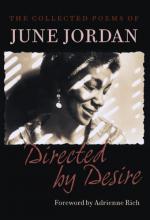|
This section contains 2,030 words (approx. 7 pages at 300 words per page) |

|
SOURCE: "Probable Reason, Possible Joy," in The Kenyon Review, Vol. 14, No. 1, Winter, 1992, pp. 152-57.
In the following excerpt, Baker reviews Jordan's Naming Our Destiny: New and Selected Poems in the context of contemporary American poetry, pointing out what he perceives as the strengths and weaknesses of Jordan's work.
Occasionally I feel about Diane di Prima's poems the way I do about June Jordan's—that she writes poems as if poetry were sometimes rather far down on her list of interests. That is both compliment and complaint. Jordan is obviously devoted to the poetics of politics and judgment; she's a poetry activist. Her aesthetic includes, not only the casual or democratic sensibilities of free verse, but also the bald, repetitive, encantatory powers of oratory; hers is persistently spoken poetry, whose closest contact with song is the chant and, occasionally, the heavily stressed, feigned naïveté of the blues, as...
|
This section contains 2,030 words (approx. 7 pages at 300 words per page) |

|


